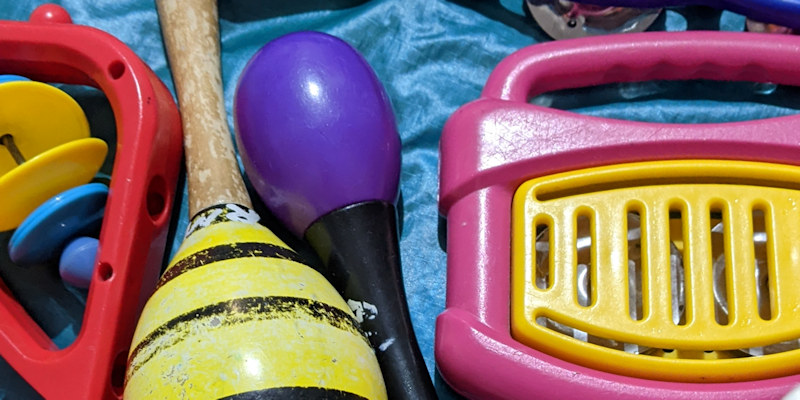Rucksack Music was set up in 1997! The ethos has always been about providing a relaxed musical atmosphere – not necessarily calm – but relaxed so that the adults in the room can sit and enjoy – either joining in as much as the kids do – or just watching their child experience the new songs/sounds/instruments and people. Music groups are, for the child and the adults, as much about the social side of life as they are about music. The concepts of sharing and cooperation are developed as the children move throughout the space; the babies aspire to their older counterparts, learning from them and, I feel, developing more quickly.
To give you some insight into music and development
In my opinion music, for children, is the “life-blood of learning”. This statement might seem over the top – but when you look at the increasingly researched effects of music, harmony, sound and melody on babies and children of a young age and how it enhances their learning and their ability to learn, I feel that the term “life-blood of learning” is a good analogy.
When a child hears music they react to the sounds – even in the womb. Some sounds soothe, some encourage the child to move to it. Beats (fast and slow), sounds (loud and soft); these all innately bring some form of reaction. When we put a child to bed – what sort of music do we play? When we want to have a dance and a giggle – what sort of music do we play?
Music provokes a response – and it is not always a response you can see. I am sure we all put on types of music that suit our mood. Children react in the same way – and in the listening they begin to discover how to use their bodies; how to coordinate their hands to clap; their feet to stamp and their heads to nod. Basic skills are enhanced – all innately – nothing pushed or “taught”.
Language development is enhanced. They use their vocal chords; they shape their mouths to imitate the words or sounds they hear eg – twinkle twinkle little —AHHH; or Zoom Zoom —OOOmmm. Basic mathematical understanding begins to develop; Melodies induce basic counting; the one, two, three, four beats of a march and the structure of the music helping them to beat or clap to the music.
Research has found that school-aged children who are surrounded by music achieve higher scores in tests than their counterparts, even when the IQ of those children is the same. The basic neural pathways, I have read, become stronger and the two sides of the brain are more developed as a whole. Imagination, creativity and their interaction with the more practical side of the brain seems to become stronger, enabling the child to grow into a more “rounded” person.
I am not an “expert” on these matters, but I am becoming more and more determined to understand and advocate the pure “joy” that music can bring into a child’s everyday life and I want parents to feel confident that they are giving their child a head start in life by encouraging a love of music, in whatever form it may take and however young they are. Listening to songs on a tape in the car; playing some Mozart or Bach to sooth before bed; stomping around a room to a John Philip Sousa marching song at a music group or simply singing your way around the house.
All music enhances!
Amy Maguire (Founder)

